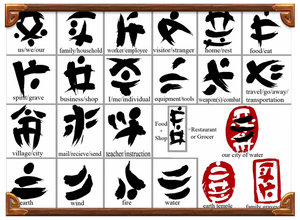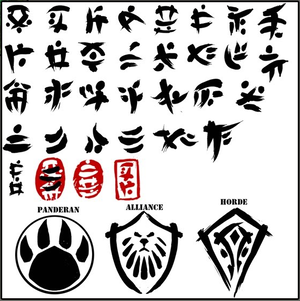Pandaren (language)
The term Pandaren can refer to two languages: the "old tongue", and the modern pandaren language, which has been adopted from the mogu and may actually be coterminous with their own language (see speculation). The latter is spoken by pandaren players in World of Warcraft, while the former can be heard in some in-game quests.
The old tongue
The "old tongue" is the term used for the original language of the pandaren, spoken before mogu enslavement. All writings in that language were burned after Lei Shen established the mogu empire, an act fueled by his distrust of the pandaren and their peaceful philosophy. All pandaren leaders and philosophers were executed, with the pandaren forbidden to learn to read or write (a policy later relaxed under Emperor Tsao);[1] anyone caught speaking anything but the mogu tongue was considered to be a conspirator, a charge often punished with slow, brutal death. All pandaren art was also burned along with their literature.[2][3][4] As a result of this, the old tongue has practically disappeared, displaced by Mogu.
However, despite this, the old tongue has survived to the modern age, although it is now considered a "language of emperors and scholars", with most common pandaren unable to speak or understand it. The Song of Liu Lang, an ancient pandaren song that tells the story of Liu Lang and his adventures on the back of Shen-zin Su, is sung by Lorewalker Cho at the Wanderer's Festival. Lorewalker Ruolin also sung it to pandaren children, though they could not understand any of the words.[5]
The modern language
Ages later, other great pandaren scholars would be born, but the language they spoke was not truly their own:[2] this modern pandaren language is in fact the language of the mogu (or at least descended from it).
According to Vol'jin, Pandaren seems to have a half dozen words for almost everything, with nuances an outsider would never understand and which the pandaren can use to mask their true intent.[6]
Player characters speaking Pandaren in-game have their words translated into "om" (for <2-letter words) and "nom" (for >2-letter words) to non-pandaren, producing little more than "om nom nom" joke speech. Since patch 7.0.3, pandaren can now use their racial language to communicate with pandaren of the opposite faction.[7] Before, only pandaren of the same faction understood the Pandaren language, so there were effectively two Pandaren languages in the game, one for each faction.
Words
There are several unique words and expressions used by pandaren, that may or may not represent Pandaren speech:
- Jian: A word with a number of meanings, all centered around greatness. While Vol'jin was recovering at the Shado-Pan Monastery, the Shado-Pan referred to him as "Vol'jian", which rolled off their tongues more easily. At first, they used "jian" to describe his clumsiness, but later used it to mark the speed with which he learned from them. After Vol'jin conquered his doubt by punching through a stone slab, the monk's emphasis on "jian" changed again.[8]
- Pandowan: a term for the young Pandaren who are training on the Wandering Isle[9][10] (likely based on the term 'Padawan' from the Star Wars series, meaning an apprentice or student).[11]
- Pandriarch: likely based on the term "patriarch". Used in the names of the ancestors of the Goldendraft, Windfur and Bramblestaff families.
- Paw-paw: the pandaren equivalent of the word "papa" (father).[12]
- Chi = "Spirit"[13]
- Chu'shao = "Counselor" (Used to refer to either the prosecutor or the defender in a trial under pandaren law).[14]
- Fa'shua = "Judge"[14]
- Tan-Chao = A bridge from the living world to the heavens.[15]
In the RPG
Untranslated words
Names
Pandaren naming practices are similar to those of humans: each pandaren has a given name and a surname.
- Male Names: Chen, Jinto, Kesha, Masha, Mushi, Polo, Sinjo.
- Female Names: Huan, Jiang, Lian, Mei, Ping, Shui, Zi.
- Surnames: Earthsong, Greentouch, Honeybrew, Lightgrace, Reedwine, Sweetbarrow, Swiftpaw.
Trivia
- When concepting Mists of Pandaria, it became obvious to the developers that a written language for them was missing, using generic runes and hieroglyphs as usual wouldn't work in this case. They thus made a written pandaren alphabet, inspired from Nushu, a secret written language developed by Chinese women in the 15th century.[20]
Speculation
This article or section includes speculation, observations or opinions possibly supported by lore or by Blizzard officials. It should not be taken as representing official lore.
|
Relationship between Mogu and modern Pandaren
The relationship between the languages of the pandaren and the mogu are unclear. Although it has been stated in Chronicle as well as in-game that pandaren were forced to abandon their language in favour of that of the mogu, Mists of Pandaria generally treats Pandaren and Mogu as two separate languages, rather than one. Indeed, the pandaren adventurer is unable to read ancient mogu texts in the Kun-Lai Summit, and even Lorewalker Cho takes time to translate them.[21] The mogu also do not appear to use the same Nushu-inspired glyphs as the pandaren.
It is possible that, although the pandaren did adopt Mogu during Lei Shen's rule, enough differences have appeared since then for their language to be considered separate. In real life, enslaved or otherwise subjugated populations would often adopt their rulers' language, but with the influence of their native speech, creating mixed languages known as creoles. It is possible that Pandaren at least originated as such a creole: the mogu language as spoken by pandaren, with the phonology and grammar of their "old tongue" "creeping in". The 12,000 years of separation would then presumably cement these differences, so that now pandaren can no longer understand mogu texts.
Of course, it is also possible that "Pandaren" and "Mogu" are simply two names for the same language, and the only reason Lorewalker Cho was unable to read mogu texts right away was their age, with the modern pandaren and mogu still capable of understanding one another. The fact that the pandaren and the mogu still use the same naming customs (Mandarin-inspired first names and descriptive surnames) lends credence to that theory, especially since other Pandarian races, such as the jinyu, have completely different names.
Other
- The description of Pandaren given in Vol'jin: Shadows of the Horde seems to imply that it is a tonal language, similar to most Chinese languages. That would mean that Pandaren words can change meaning completely based on their intonation, even if they are pronounced identically otherwise, like how "jian" seemed to change its meaning in the novel. Indeed, jian in Mandarin has more than 250 different spellings and meanings.
- If the theory of pandaren sharing their ancestry with furbolgs is correct, then it is likely that their "old tongue" is related to Furbolg. Meanwhile, being descended from Mogu, the modern pandaren language is likely of Titan origin.
Patch changes
 Patch 7.0.3 (2016-07-19): Pandaren players can now use the Pandaren language for cross-faction communication.
Patch 7.0.3 (2016-07-19): Pandaren players can now use the Pandaren language for cross-faction communication.
References
- ^ The Legacy of Emperor Tsao
- ^ a b The Pandaren Problem
- ^ Unity at a Price
- ^ World of Warcraft: Chronicle Volume 1, pg. 82 - "Fearing that the pandaren's peaceful philosophies would undermine his rule, Lei Shen forbade them from learning how to read or write, or even how to speak any language other than the mogu tongue. To disobey was to be killed in slow, brutal fashion."
- ^ Lorewalker Amai#History lesson
- ^ Vol'jin: Shadows of the Horde, pg. 40
- ^ BlizzardCS on Twitter (2016-07-21). Retrieved on 2018-06-14. “@Igiarin: "Still want to know if Pandaren being able to cross-faction talk with the "Pandaren" language is intented or if it's a bug." @BlizzardCS: "Yes, this is intended. ^JH"”
- ^ Vol'jin: Shadows of the Horde, pages 50 - 52
- ^ Pearl of Pandaria, pg. 11
- ^ Micky Neilson on Twitter (2013-02-13). “Pandowan is meant to be a term for the young Pandaren who are training on the turtle.”
- ^ Wiktionary: Padawan
- ^ Trapped!#Notes
- ^ Dave Kosak on Twitter (2014-02-21) - ""Chi" is the Pandaren word for "Spirit," same energy that helps shaman heal, etc."
- ^ a b War Crimes
- ^
 [10-35] Ritual Artifacts
[10-35] Ritual Artifacts
- ^ Manual of Monsters, pg. 76
- ^ Dark Factions, pg. 16
- ^ Manual of Monsters, pg. 80
- ^ a b Manual of Monsters, pg. 78
- ^ Mists of Pandaria languages and lore by Kevin Maginnis
- ^
 [20-35] It Was Almost Alive
[20-35] It Was Almost Alive


